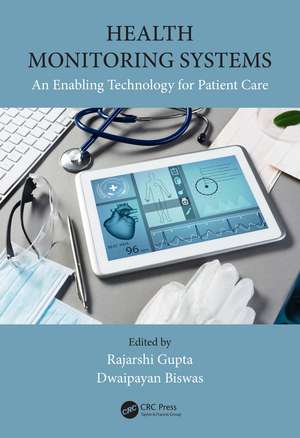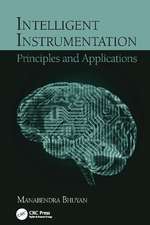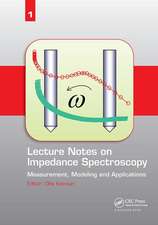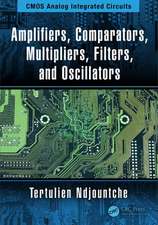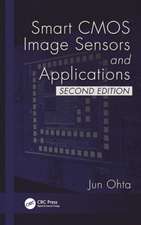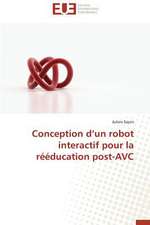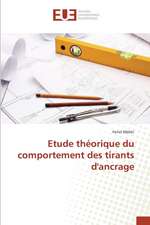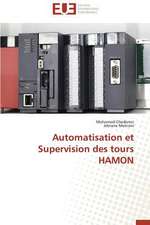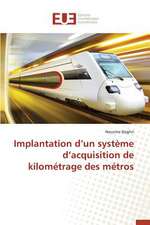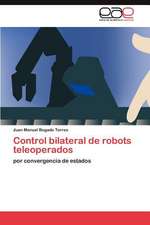Health Monitoring Systems: An Enabling Technology for Patient Care
Editat de Rajarshi Gupta, Dwaipayan Biswasen Limba Engleză Hardback – 2 dec 2019
Health Monitoring Systems: An Enabling Technology for Patient Care provides a holistic overview of state-of-the-art monitoring systems facilitated by Internet of Things (IoT) technology. The book lists out the details on biomedical signal acquisition, processing, and data security, the fundamental building blocks towards an ambulatory health monitoring infrastructure. The fundamentals have been complimented with other relevant topics including applications which provide an in-depth view on remote health monitoring systems.
Key Features:
- Presents examples of state-of-the-art health monitoring systems using IoT infrastructure
- Covers the full spectrum of physiological sensing, data acquisition, processing, and data security
- Provides relevant example applications demonstrating the benefits of technological advancements aiding disease prognosis
Preț: 881.28 lei
Preț vechi: 1219.16 lei
-28% Nou
Puncte Express: 1322
Preț estimativ în valută:
168.63€ • 176.06$ • 139.56£
168.63€ • 176.06$ • 139.56£
Carte tipărită la comandă
Livrare economică 05-19 aprilie
Preluare comenzi: 021 569.72.76
Specificații
ISBN-13: 9781498775823
ISBN-10: 1498775829
Pagini: 336
Ilustrații: 186
Dimensiuni: 178 x 254 x 24 mm
Greutate: 0.77 kg
Ediția:1
Editura: CRC Press
Colecția CRC Press
ISBN-10: 1498775829
Pagini: 336
Ilustrații: 186
Dimensiuni: 178 x 254 x 24 mm
Greutate: 0.77 kg
Ediția:1
Editura: CRC Press
Colecția CRC Press
Cuprins
Foreword
Preface
Acknowledgments
Editors
Contributors
1 Remote Healthcare Technology: A New Paradigm
Dwaipayan Biswas
2 Biomedical Sensors and Data Acquisition
Rajarshi Gupta
3 Data Compression in Health Monitoring
Sourav Kumar Mukhopadhyay and Rajarshi Gupta
4 Health Monitoring Based on Internet of Things (IoT)
Domenico Balsamo and Saptarshi Das
5 Telemedicine Technology
Jayanta Mukhopadhyay
6 Biomedical Signal Analysis
Simone Benatti, Victor Kartsch, Fabio Montagna, Elisabetta Farella, and Velu P. Kumaravel
7 Pervasive Computing in Cardiovascular Healthcare
Chandrajit Pal, Naresh Vemishetty, and Amit Acharyya
8 Trusted Digital Solutions and Cybersecurity in Healthcare
I. E. Lamprinos
9 Novel e-Health and m-Health Services
I. E. Lamprinos
10 Activity Monitoring of Elderly Patients
Dwaipayan Biswas
11 Blood Pressure Monitoring
Rajarshi Gupta
12 Wireless Telecardiology
Luca Monzo, Michele Schiariti, and Paolo Emilio Puddu
13 Diabetes Monitoring System
Saptarshi Das
Index
Preface
Acknowledgments
Editors
Contributors
1 Remote Healthcare Technology: A New Paradigm
Dwaipayan Biswas
2 Biomedical Sensors and Data Acquisition
Rajarshi Gupta
3 Data Compression in Health Monitoring
Sourav Kumar Mukhopadhyay and Rajarshi Gupta
4 Health Monitoring Based on Internet of Things (IoT)
Domenico Balsamo and Saptarshi Das
5 Telemedicine Technology
Jayanta Mukhopadhyay
6 Biomedical Signal Analysis
Simone Benatti, Victor Kartsch, Fabio Montagna, Elisabetta Farella, and Velu P. Kumaravel
7 Pervasive Computing in Cardiovascular Healthcare
Chandrajit Pal, Naresh Vemishetty, and Amit Acharyya
8 Trusted Digital Solutions and Cybersecurity in Healthcare
I. E. Lamprinos
9 Novel e-Health and m-Health Services
I. E. Lamprinos
10 Activity Monitoring of Elderly Patients
Dwaipayan Biswas
11 Blood Pressure Monitoring
Rajarshi Gupta
12 Wireless Telecardiology
Luca Monzo, Michele Schiariti, and Paolo Emilio Puddu
13 Diabetes Monitoring System
Saptarshi Das
Index
Notă biografică
Rajarshi Gupta received his M.Tech and PhD (Tech) in Instrumentation Engineering from University of Calcutta, India in 2002 and 2012 respectively. He is currently an Associate Professor with the Electrical Engineering Section, Department of Applied Physics, University of Calcutta, India. His research interests include cardiovascular signal measurements, and intelligent health monitoring. He has published 50 papers in peer reviewed international journals and conferences, 3 book/book chapters, with a Google Scholar Citation of 523, h-index of 12 and i-10 index of 12. He is currently associated as principal investigator/ co-principal investigator of 5 funded projects, with total funding of INR 62 lakhs in the area of biomedical devices and systems development. He has guided one PhD student and currently guiding five PhD students. Rajarshi is an active volunteer in IEEE and IET professional activities and has been associated with many flagship conferences in key positions.
Dwaipayan Biswas received his MSc in System on Chip, 2011 and his PhD in Electrical Engineering, 2015, from University of Southampton (UoS), UK. During this period, he was involved with three European Union funded projects, namely Chiron (https://artemis-ia.eu/project/17-chiron.html), StrokeBack (https://www.strokeback.eu/) and PLEASED (https://www.physense.eu/pleased-project/). His research focused on developing low-complexity algorithm and architecture design targeting low-power VLSI implementation. He went on to work as a post-doctoral research fellow at UoS, 2015 – 2016, on Engineering and Physical Sciences Research Council (EPSRC) funded projects – Refresh (http://www.refresh-project.org.uk/) and Prime (http://www.prime-project.org/). He worked on smart office design based on cognitive monitoring and energy optimization for many-core embedded platforms. On November, 2016, he joined IMEC, Belgium, as a researcher on digital IC design for biomedical applications. He has been working on digital front-ends for low-power biomedical sensor readouts aimed at pervasive health monitoring. Further he has been actively involved in embedded algorithm-architecture development for motion artifact reduction during ambulatory sensing. His research interests include low-power VLSI design, biomedical signal processing, machine learning, brain computer interface and computer architecture. He has authored over 40 peer reviewed articles including journals, conference publications and book chapters.
Dwaipayan Biswas received his MSc in System on Chip, 2011 and his PhD in Electrical Engineering, 2015, from University of Southampton (UoS), UK. During this period, he was involved with three European Union funded projects, namely Chiron (https://artemis-ia.eu/project/17-chiron.html), StrokeBack (https://www.strokeback.eu/) and PLEASED (https://www.physense.eu/pleased-project/). His research focused on developing low-complexity algorithm and architecture design targeting low-power VLSI implementation. He went on to work as a post-doctoral research fellow at UoS, 2015 – 2016, on Engineering and Physical Sciences Research Council (EPSRC) funded projects – Refresh (http://www.refresh-project.org.uk/) and Prime (http://www.prime-project.org/). He worked on smart office design based on cognitive monitoring and energy optimization for many-core embedded platforms. On November, 2016, he joined IMEC, Belgium, as a researcher on digital IC design for biomedical applications. He has been working on digital front-ends for low-power biomedical sensor readouts aimed at pervasive health monitoring. Further he has been actively involved in embedded algorithm-architecture development for motion artifact reduction during ambulatory sensing. His research interests include low-power VLSI design, biomedical signal processing, machine learning, brain computer interface and computer architecture. He has authored over 40 peer reviewed articles including journals, conference publications and book chapters.
Descriere
Modern healthcare is dominated by diagnostic instruments, devices and analytical tools. This book will explore the information on state-of-the-art technologies on health monitoring systems. While a part of the book will describe the hardware used in remote healthcare technology, another part will describe the software outlines.
